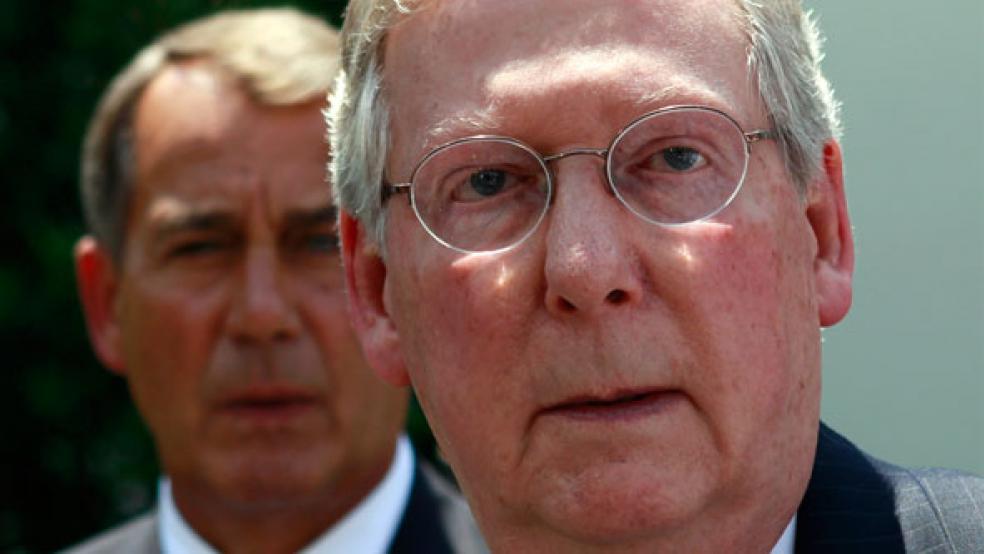Senate Minority Leader Mitch McConnell (R-KY) on Sunday indicated the Republicans will try once again to gain a major legislative concession from President Obama over raising the debt ceiling, despite the president’s insistence he no longer will bargain over raising the government’s borrowing authority.
During an appearance on “Fox News Sunday,” McConnell said it was “unreasonable” for Obama to think he can extract congressional approval of a new borrowing limit without giving up something in return. He noted that former presidents going back to Dwight D. Eisenhower and Bill Clinton negotiated major legislative deals with Congress in tandem with boosting the debt ceiling.
Related: Debt Ceiling Déjà Vu: New Showdown Ahead?
McConnell and House Speaker John Boehner (R-OH) seemingly signaled after the 16-day government shutdown last October that Republicans would not attempt again to raise the specter of a default on U.S. debt to extract demands, as they did in 2011 and again last year. More recently, however, McConnell has been saying there’s no way Obama could get a “clean” debt ceiling bill through Congress without giving up something in return.
“I think for the president to ask for a clean debt ceiling when we have a debt the size of our economy is irresponsible,” McConnell said, adding that Republicans will not treat new debt ceiling legislation like “some kind of motherhood resolution where everyone just says ‘aye.’”
McConnell mentioned two possible concessions the GOP will seek – neither of which has much chance of winning presidential approval:
-
- Agreement to build the Keystone XL pipeline. Republicans are calling on Obama to make a decision on the long-delayed Keystone XL pipeline that would carry oil derived from tar sands in western Canada to refineries on the Gulf Coast. Sens. John Hoeven, (R-ND), , and John Barrasso (R-WY), , sent a letter to the White House on Friday urging the president to approve Keystone XL, arguing the administration has had "more than enough time" to study the project.
"Given the length of time your administration has studied the Keystone XL pipeline and the public's overwhelming support for it, you should not further delay a decision to issue a Presidential permit," the senators wrote. The letter, which was signed by all 45 Republican senators, noted that Obama told Senate Republicans during a March 2013 meeting that a final decision on Keystone would be made before the end of the year. Obama is under equal pressure from his allies in the environmental community to oppose pipeline construction.
- Agreement to build the Keystone XL pipeline. Republicans are calling on Obama to make a decision on the long-delayed Keystone XL pipeline that would carry oil derived from tar sands in western Canada to refineries on the Gulf Coast. Sens. John Hoeven, (R-ND), , and John Barrasso (R-WY), , sent a letter to the White House on Friday urging the president to approve Keystone XL, arguing the administration has had "more than enough time" to study the project.
Related: Canada Warns Obama on Keystone XL Pipeline
- Support for eliminating an insurance industry “bailout” measure from the Affordable Care Act. At issue is a provision for so-called “risk corridors” built into the health care law to limit the potential losses insurers could suffer and the gains they could reap during the first three years of the transition.
Under the provision, if an insurance company’s actual claims in 2014 are at least 3 percent greater than the claims projected when it set its rates, the government would be required to reimburse the insurer for half of the excess. If its actual claims increased 8 percent above the projected claims, the government would cover 80 percent of the excess, according to the American Academy of Actuaries.
House Budget Committee Chairman Paul Ryan (R-WI) last week that the GOP wants to repeal this “insurance bailouts” as part of a larger deal to raise the nation’s borrowing limit. However, the administration supported the risk corridors as an essential inducement to get the insurance industry to go along with the health care reform legislation, and Obama is unlikely to renege on that agreement.
Treasury Secretary Jack Lew warned recently that the Treasury will run out of money and need additional borrowing authority by the end of February.
Under last fall’s agreement to end a 16-day government shutdown and budget crisis, Congress and the White House agreed to suspend enforcement of the debt limit until Feb. 7. Since President Obama first took office in January 2009, Congress has raised or suspended the debt ceiling seven times – including its decision in late October to suspend the borrowing limitation at $16.7 trillion.
Related: Debt Ceiling: What Is It and Why Does It Matter?
The national debt is currently $17.2 trillion, which means lawmakers and the president must negotiate a new legal debt limit that authorizes Treasury borrowing well above that amount in the coming months.
The debt ceiling has been the source of some of the most bruising political skirmishes between Obama and congressional Republicans and led to a near-financial disaster in the summer of 2011, when the Treasury came within days of defaulting on its debt for the first time.
Senior presidential adviser Dan Pfeiffer today reaffirmed Obama’s refusal to negotiate over the debt ceiling, saying it was the government’s responsibility to make good on its borrowing commitments during an appearance on “Fox News Sunday.” Sen. Chuck Schumer (D-NY.), appearing on the CBS News program “Face the Nation,” said he thinks the Republicans have “learned their lesson” after the public backlash to previous fiscal crises sparked by Tea Party activists including Sen. Ted Cruz (R-TX).
“I do not believe that Republican leaders will follow Ted Cruz over the cliff again,” he said.
Top Reads from the Fiscal Times:





